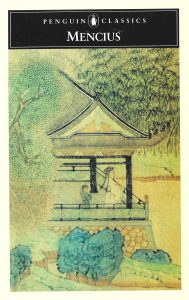Mencius
By Mencius (372–289 BC or 385–303 or 302 BC), translation and introduction by D.C. Lau.
280 Pages | First published 1970 | Paperback | Penguin Books, London | ISBN: 0140442286.
With an introduction by D.C. Lau.
" The Mencius is the most beautifully written and perhaps the most authorative of the Four Books that make up the essential Confucian corpus. "
As centralized government replaced feudalism in China, the ideas of Confucius (551 - 479 B.C.) faced the challenge of increasing cynicism. It was Mencius, in the years just after 320 B.C., who adapted them to the new age and thus helped to formulate a Confucian orthodoxy that has remained deeply influential ever since. Whether he is expounding his doctrine of the basic goodness of human nature - the 'original heart', which can be lost or overwhelmed by our selfish impulses - developing his method of argument by analogy or offering strikingly modern views on the duties of the subjects and their rulers and the evils of war, Mencius is always fascinating and often profound. This superb translation, complete with a masterly Introduction and Appendices on the historical and philosophical background, presents him directly to the English reader.
 Bezig met bijwerken...
Bezig met bijwerken...